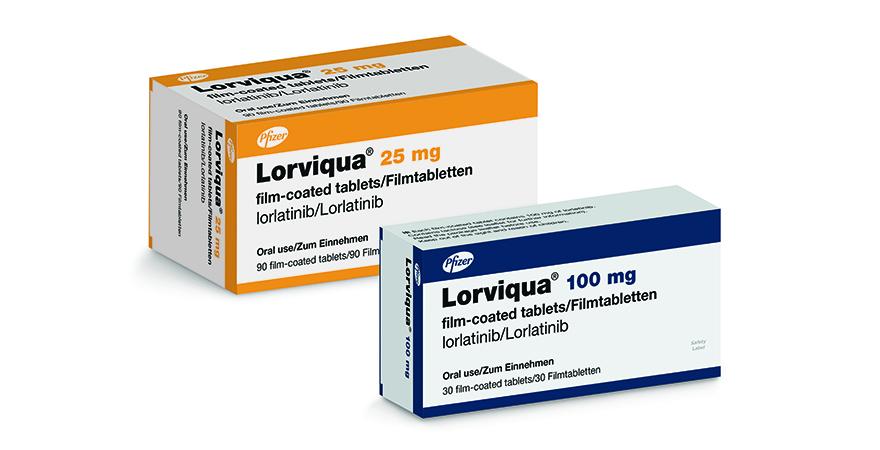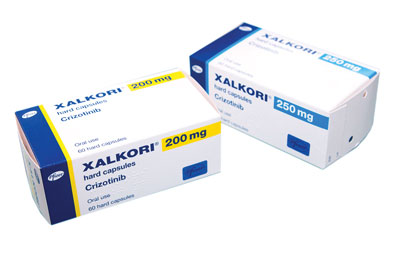Lorviqua (lorlatinib) vs Xalkori (crizotinib)
Lorviqua (lorlatinib) vs Xalkori (crizotinib)
Lorviqua (lorlatinib) and Xalkori (crizotinib) are both oral medications used to treat certain types of non-small cell lung cancer (NSCLC) that are driven by specific genetic alterations. Lorlatinib is a third-generation anaplastic lymphoma kinase (ALK) inhibitor designed to target ALK-positive cancer cells and is known to be effective even in patients who have developed resistance to earlier ALK inhibitors, such as crizotinib. On the other hand, crizotinib is a first-generation ALK inhibitor and is also effective against ROS1-positive NSCLC, but patients may eventually develop resistance to this medication, at which point treatment with a more advanced ALK inhibitor like lorlatinib may be considered.
Difference between Lorviqua and Xalkori
| Metric | Lorviqua (lorlatinib) | Xalkori (crizotinib) |
|---|---|---|
| Generic name | lorlatinib | crizotinib |
| Indications | ALK-positive metastatic non-small cell lung cancer (NSCLC) | ALK or ROS1-positive metastatic NSCLC |
| Mechanism of action | ALK and ROS1 tyrosine kinase inhibitor | ALK, MET, and ROS1 tyrosine kinase inhibitor |
| Brand names | Lorviqua | Xalkori |
| Administrative route | Oral | Oral |
| Side effects | Hypercholesterolemia, hypertriglyceridemia, edema, peripheral neuropathy, cognitive effects | Visual disorders, gastrointestinal effects, edema, elevated transaminases, neutropenia |
| Contraindications | Hypersensitivity to lorlatinib | Hypersensitivity to crizotinib |
| Drug class | Tyrosine kinase inhibitor | Tyrosine kinase inhibitor |
| Manufacturer | Pfizer | Pfizer |
Efficacy
Lorviqua (lorlatinib) Efficacy in Lung Cancer
Lorviqua, known generically as lorlatinib, is a medication that has shown efficacy in the treatment of certain types of lung cancer. Specifically, it is a third-generation anaplastic lymphoma kinase (ALK) inhibitor designed to target and inhibit the activity of the ALK protein, which can drive the growth of tumors in non-small cell lung cancer (NSCLC) with ALK mutations. Clinical trials have demonstrated that lorlatinib is effective in patients who have progressed on prior ALK inhibitors, such as crizotinib, ceritinib, or alectinib. The response rate and duration of response with lorlatinib have been significant, offering a valuable treatment option for patients with ALK-positive metastatic NSCLC, particularly those with brain metastases, as lorlatinib has been shown to have good central nervous system (CNS) penetration.
Xalkori (crizotinib) Efficacy in Lung Cancer
Xalkori, with the generic name crizotinib, is another targeted therapy that has shown efficacy in the treatment of ALK-positive NSCLC. As a first-generation ALK inhibitor, crizotinib has been a standard treatment option for patients with advanced NSCLC that harbor ALK rearrangements. Clinical studies have shown that crizotinib significantly improves progression-free survival compared to chemotherapy in previously untreated ALK-positive NSCLC patients. However, resistance to crizotinib often develops, leading to disease progression. In such cases, second- and third-generation ALK inhibitors like lorlatinib can be considered for subsequent lines of therapy.
Comparative Efficacy and Considerations
When comparing lorlatinib and crizotinib, it is important to consider the line of therapy and the specific patient's disease characteristics. While crizotinib may be used as a first-line treatment, lorlatinib is often reserved for later lines after the development of resistance to earlier ALK inhibitors. Lorlatinib's ability to penetrate the blood-brain barrier makes it particularly effective for treating and preventing CNS metastases, a common complication in ALK-positive NSCLC. On the other hand, crizotinib has limited efficacy in the CNS due to its poor penetration of the blood-brain barrier.
Conclusion
Both Lorviqua (lorlatinib) and Xalkori (crizotinib) have shown efficacy in the treatment of ALK-positive NSCLC, offering hope for improved outcomes in this subset of lung cancer patients. The choice of agent depends on several factors, including prior treatments, the presence of CNS metastases, and the patient's overall health status. As with all cancer therapies, the efficacy of these drugs must be balanced with potential side effects, and treatment decisions should be made in collaboration with a healthcare team specialized in lung cancer. Ongoing research continues to refine the use of these agents and to explore their roles in combination with other treatments to further enhance their efficacy against lung cancer.
Regulatory Agency Approvals
Lorviqua
-
European Medical Agency (EMA), European Union

-
Food and Drug Administration (FDA), USA

-
Health Canada

-
Therapeutic Goods Administration (TGA), Australia

Xalkori
-
European Medical Agency (EMA), European Union

-
Food and Drug Administration (FDA), USA

-
Health Canada

-
Pharmaceuticals and Medical Devices Agency (PMDA), Japan

-
Therapeutic Goods Administration (TGA), Australia

Access Lorviqua or Xalkori today
If Lorviqua or Xalkori are not approved or available in your country (e.g. due to supply issues), you can access them via Everyone.org.
How it works

Make an enquiry
Choose the medicine you want to buy, answer a couple of questions, and upload your prescription to speed things up. We’ll get back to you within 24 hours.


Make an enquiry
Choose the medicine you want to buy, answer a couple of questions, and upload your prescription to speed things up. We’ll get back to you within 24 hours.


Breeze through the paperwork
We'll guide you through the required documents for importing unapproved medicine, ensuring you have all the necessary information.


Get a personalized quote
We’ll prepare a quote for you, including medicine costs and any shipping, administrative, or import fees that may apply.


Receive your medicine
Accept the quote and we’ll handle the rest - sourcing and safely delivering your medicine.

Some text on this page has been automatically generated. Speak to your physician before you start a new treatment or medication.
Let's talk
If you have any questions, call us or send us a message through WhatsApp or email:
Contact us




